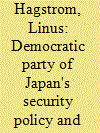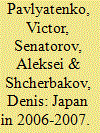| Srl | Item |
| 1 |
ID:
076811


|
|
|
| 2 |
ID:
099443


|
|
|
|
|
| Publication |
2010.
|
| Summary/Abstract |
A Referendum Law took effect in Japan in May 2010. Since a referendum is a prerequisite to any change to the Japanese 'Peace Constitution', this is an event with potentially far-reaching consequences. By gauging the Democratic Party of Japan's views on the issue of revision of the constitution-particularly revision of the famous Article 9, with remains a foundation of Japanese security policy-and by extrapolating on the findings, this article aims to further the understanding of the new government's security policy more generally. After finding that the probability that the Japanese government will capitalise on the coming into force of the Referendum Law to reopen the constitutional debate is currently low, the article advances a number of hypotheses as to why this is the case, and discusses scenarios under which the status quo could change. Finally, it draws out the implications (a) of the preceding analysis for DPJ security policy, and (b) of DPJ security policy for the interpretation of the constitution where Article 9 is concerned.
|
|
|
|
|
|
|
|
|
|
|
|
|
|
|
|
| 3 |
ID:
093323


|
|
|
| 4 |
ID:
084044


|
|
|
|
|
| Publication |
2008.
|
| Summary/Abstract |
The central event in the political life of Japan in 2006 was the change of the country's leader. After staying in power for five and a half years (the longest period among all prime ministers of Japan since 1945) Junichiro Koizumi left his post of the head of the ruling party and government. A new leader has come to replace him.
|
|
|
|
|
|
|
|
|
|
|
|
|
|
|
|
| 5 |
ID:
094196


|
|
|
|
|
| Publication |
London, Routledge, 2010.
|
| Description |
xii, 178p.
|
| Series |
Sheffield centre for Japanese studies/Routledge series
|
| Standard Number |
9780415450553
|
|
|
|
|
|
|
|
|
|
|
|
Copies: C:1/I:0,R:0,Q:0
Circulation
| Accession# | Call# | Current Location | Status | Policy | Location |
| 054819 | 327.52047/BUK 054819 | Main | On Shelf | General | |
|
|
|
|
| 6 |
ID:
097332


|
|
|
| 7 |
ID:
096599


|
|
|
|
|
| Publication |
2010.
|
| Summary/Abstract |
Business interests are overrepresented in Hong Kong's nominally democratic political institutions. Many in Hong Kong perceive this as evidence of the existence of "collusion between government and business," a phenomenon that has stirred public concerns in the city since its sovereignty transfer. Although anecdotal accounts abound, no systematic analysis has been conducted to evaluate the validity of this perception. In this article I use a rich firm-level dataset to offer the first systematic assessment of the effects of political connections on firm performance in Hong Kong. I define politically connected firms as firms that have stakeholders concurrently holding a seat on the Election Committee, a constitutional body that elects the city's chief executive. I found evidence, though not overwhelming, consistent with the "collusion" hypothesis: political connections do improve firm performance measured by return on equity and market-to-book ratio. The improvement is unlikely due to unobserved confounding factors such as firms' inherent ability. As for the origin of the political connections, the data show that a firm's economic power has little predictive value of its connections to the Election Committee. Rather, number of employees matters; firms that hire fewer workers were more likely to gain a seat on the 1997 Election Committee. This result may suggest that Beijing plays a more dominant role in the formation of political connections-that serve Beijing's co-optation needs rather than the interests of powerful firms that may have a desire to "capture" the state.
|
|
|
|
|
|
|
|
|
|
|
|
|
|
|
|